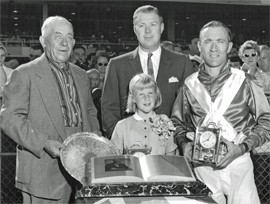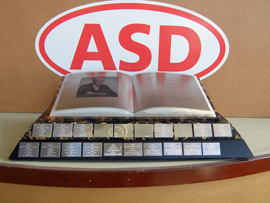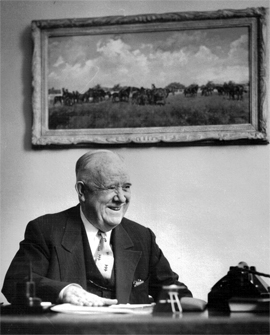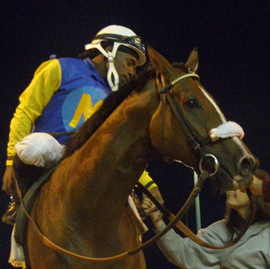
1960 Speers Handicap presentation ceremony (L to R) E. Johanson, Scotty Kennedy, Gene Pederson. Scotty’s daughter Joan in front.
by Bob
Sixty years ago this past July 19, Robert James Speers, the “Father of Thoroughbred Horse Racing on the Canadian Prairies” died as a result of a massive heart attack at his home in River Heights, right here in Winnipeg.
Speers was only 72 when he was laid to rest in Elmwood Cemetery. Wednesday, August 19, marks the 56th running of the race that bears his name and pays homage to his legacy, the R. J. Speers Stakes.
The death of R. J. Speers had a profound effect on the history of racing in Winnipeg! Polo Park, the race track he built in 1925, didn’t last a year once he was gone. The last day of racing at Polo Park was July 4, 1956.
Jack Hardy would step up to the plate and lay the groundwork for his Assiniboia Downs to open June 10, 1958, but not before the entire 1957 racing season was lost! You can read more about R. J. Speers here.
The “birth” of the race to honour Speers came in 1959. At the start of its 1959 race meet, Assiniboia Downs held a “Name the Race” contest. In a unanimous decision, the name chosen for the annual $5,000 added classic was the R. James Speers Memorial Handicap, a fitting tribute for a man that had done so much for horse racing.
The winner of the inaugural R. James Speers Memorial Handicap in 1959 was Silver Ring. The race has been run on annual basis ever since, with the exception of 1987. The 1987 contest was canceled when the jockeys refused to ride as a result of dangerous wind conditions, and the race was never rescheduled. Much to the disappointment of horsemen, the purse (which at that time had reached $20,000) was used to reduce a purse overpayment situation which was estimated at nearly $150,000.
While new to Assiniboia Downs in 1959, the original Speers Handicap was inaugurated by Speers in 1926. The race was run annually at old Polo Park racetrack until it closed in 1956.
In 1960 the Horsemen’s Benevolent and Protective Association of Western Canada donated a unique trophy for the annual competition. The trophy, mounted on a heavy marble base, is in the form of an open book in silver. On one side is a picture of Mr. Speers and on the opposite side is a well-deserved tribute which says it all:
“The R. James Speers Trophy, presented to Assiniboia Downs for the annual running of the R. James Speers Memorial Handicap by The Horsemen’s Benevolent and Protective Association of western Canada; Lucien Maynard, President, 1960. To honor R. James Speers, whose courage, vision, enterprise and unwavering optimism enabled him to establish thoroughbred racing on a sound foundation in western Canada. The name of R. James Speers, whose home was in Winnipeg, but whose proudest boast was that he was a Canadian, has been inscribed in the imperishable records of the sport which he loved.”
_____________________________
Speers Stakes Fast Facts:
— Six horses have won the race twice. Four horses won the race in back to back years: Tempe Senga (1973/74), Island Fling (1977/78), Major Enterprise (1982/83), Northern Debut (1992/93). Scarlet Rich won the Speers in 1979 and 1981, while my pal Smoky Cinder won it 1999 and 2001.
— Trainers Gary Danelson and Jack Robertson have each won five Speers with Jack winning it in three consecutive years from 1989 to 1991.
— Ken Hendricks and Jimmy Anderson hold the jockey honours, each winning the race a record six times.
____________________________
“Jim” Speers is responsible for some great quotes. Two of his best had to be:
“There’s a little larceny in every man, but you notice it more around a race track.”
“Every man who has acquired a bit of money should have a hobby and a worry and he can have both, if he owns a race horse.”
No one has written the biography of the man to whom horseracing owes so much. In his book “A Hoofprint On My Heart” Jim Coleman stated his belief that Speers had selected him to be his turf biographer. However, the project never materialized. Coleman explained that the Speers family was opposed to specific references to his “deep and abiding affection for gambling.” Coleman’s feeling was simple:
“Writing a story about Jim Speers without mentioning his gambling proclivities would have been tantamount to attempting to cook an omelet without using eggs.”
The R. J. Speers Stakes is one of the highlights of the 2015 racing season at Assiniboia Downs, and not just because of its $25,000 purse. The mystique runs much deeper than money. The race honours not only Speers himself, but also his love of the sport and his many contributions to racing. Victory in the R. James Speers carries with it a unique level of prestige that only historical significance can provide.
It does, after all, honour the man who is responsible, directly or indirectly, for almost a century of racing in Winnipeg. Think about that.
When you win it.



